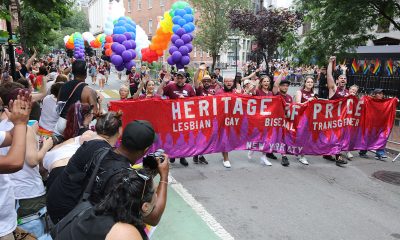Local
Longtime gay activist Frank Kameny dies
Community, public officials mourn loss of LGBT movement hero, pioneer
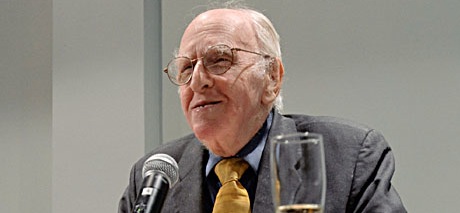
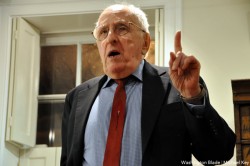
Frank Kameny’s gay rights activism predated the Stonewall riots by more than a decade. (Washington Blade file photo by Michael Key)
Expressions of condolences from LGBT activists and their straight supporters poured in from across the country this week following the death in Washington on Tuesday of Franklin E. Kameny, one of the nation’s most prominent gay rights leaders.
Friends said Kameny, 86, appears to have died in his sleep while in bed at his house in Northwest Washington. A representative of the D.C. Medical Examiner’s office, who spoke to friends and well-wishers who stood outside the house Tuesday night, said the cause of death couldn’t be immediately determined.
Kameny’s passing came a little more than a month before the planned celebration on Nov. 15 of the 50th anniversary of his founding of the Mattachine Society of Washington, the first gay rights organization in the nation’s capital.
LGBT rights advocates Charles Francis and Bob Witeck, who were longtime friends of Kameny’s and established the project to preserve Kameny’s papers over a 50-year period, said they would be announcing soon plans for a memorial service to honor the gay rights leader’s life.
Witeck said Nov. 15 is being considered as a possible date for a Kameny memorial gathering.
Timothy Clark, Kameny’s tenant and friend, said he found Kameny unconscious and unresponsive in his bed shortly after 5 p.m. on Tuesday. Clark said he became concerned when he arrived home a few minutes earlier and noticed Kameny hadn’t retrieved his newspapers, which are delivered outside the house in the morning.
He said he called 911 and rescue workers determined that Kameny had passed away earlier, most likely in his sleep. Clark said he had spoken with Kameny shortly before midnight on the previous day and Kameny didn’t appear to be ill or in distress.
Kameny is credited with being one of the leading strategists for the early gay rights movement – beginning nearly a decade before the 1969 Stonewall riots in New York’s Greenwich Village and continuing forward.
The Stonewall riots, triggered by a police raid of the Stonewall gay bar, are considered by most activist leaders as the starting point of the modern LGBT rights movement. But movement leaders credit Kameny and his collaborators in the Mattachine Society of Washington with laying the groundwork that enabled the post-Stonewall LGBT organizing to flourish.
“Frank was a revolutionary who lived to see the world change, and I’m comforted by that,” said Francis. “He was the first gay American to root the argument for gay civil equality in the words of Thomas Jefferson and the Declaration of Independence and Constitution.”
Gay historian David K. Johnson, who wrote about Kameny in two books on the gay rights movement, said Kameny broke from the early American “homophile” movement’s tactics of accommodation with the prevailing views that homosexuality was a disorder.
“Kameny’s style and tactics differed markedly from those of earlier homosexual leaders,” Johnson wrote in a 2002 article posted on the website of D.C.’s Rainbow History Project. “By unabashedly proclaiming that homosexuality was neither sick nor immoral, Kameny helped move gays and lesbians out of the shadows of 1950s apologetic, self-help groups and into the sunlight of the civil rights movement, setting the tone for a movement that continues today.”
It was during his years as head of the Mattachine Society of Washington that Kameny in July 1968 coined the phrase, “Gay is Good,” which activists say became a forerunner to the gay pride celebrations that followed the 1969 Stonewall riots.
Born and raised in New York City, Kameny served in combat as an Army soldier in World War II in Europe. After the war, Kameny received his doctorate degree in astronomy from Harvard University.
He came to Washington in 1956 to take a position teaching astronomy at Georgetown University. The following year, government recruiters persuaded him to take a job as a civilian astronomer with the U.S. Army Map Service in Washington.
NASA career derailed
Kameny told the Blade in a 2002 interview that the nation’s race against the Soviet Union for superiority in space had just begun in full force and he set his sights, among other things, on a possible role in the U.S. space program.
A short time later, Congress created the National Aeronautics and Space Administration and Kameny said he would have seriously considered applying to become an astronaut. But that was not to come about.
Just five months into his job at the Army Map Service, U.S. government security investigators uncovered information leading them to believe Kameny was gay. They opened an investigation into his alleged “threat” to national security. Within a few weeks he was dismissed from his job, with his name placed on a list of people labeled as government security risks.
Kameny challenged the dismissal before the U.S. Civil Service Commission, which set personnel policies for federal employees. The commission upheld the firing, prompting Kameny to take the matter to court. After losing in the lower courts, he appealed his case to the U.S. Supreme Court, becoming the first known gay person to file a gay-related case before the high court.
The Supreme Court upheld a lower court ruling against Kameny and declined to hear the case. But Kameny’s decision to appeal the case through the court system motivated him to become a lifelong advocate on behalf of LGBT equality.
Gay historian Johnson wrote in his 2002 article that Kameny’s lawyer withdrew from the case after the U.S. Court of Appeals ruled against Kameny, forcing Kameny to write his own appeal to the Supreme Court.
Johnson called Kameny’s 60-page legal brief filed before the high court a groundbreaking challenge to the federal government’s policy barring homosexuals from working for the government in any capacity. Johnson said it served as Kameny’s and the gay movement’s strategy document for advancing legal rights for gays in the years going forward.
Kameny’s Supreme Court brief, or petition, also offered the world its first glimpse of what became his trademark use of blunt, sometimes inflammatory language combined with reasoned arguments to challenge anti-gay policies.
“The government’s regulations, policies, practices and procedures, as applied in the instant case to petitioner specifically, and as applied to homosexuals generally, are a stench in the nostrils of decent people, an offense against morality, an abandonment of reason, an affront to human dignity, an improper restraint upon proper freedom and liberty, a disgrace to any civilized society, and a violation of all that this nation stands for,” he wrote in his Supreme Court petition.
“These policies, practices, procedures, and regulations have gone too long unquestioned and too long unexamined by the courts,” he wrote.
Gov’t apologizes to Kameny
Although Kameny lost his own case, he spent the next decade working with attorneys and other gay and lesbian federal workers to chip away at the then U.S. Civil Service Commission’s ban on gay federal employees through new court challenges. By 1975, after losing several cases to gay employees who won reinstatement to their jobs over a period of years, the Civil Service Commission dropped its ban on gay employees.
The change, which came under the administration of President Gerald Ford, was based on court rulings saying the government could not discriminate against homosexual federal employees if no evidence exists to show a harmful “nexus” between someone’s sexual orientation and their ability to perform their job.
Kameny, who called the development a major victory for gay rights, turned next to ongoing efforts to end two other anti-gay policies of the government – the ban on gays from receiving government security clearances and the ban on gays in the military.
In 2009, the Obama administration through the U.S. Office of Personnel Management – the successor agency to the Civil Service Commission – issued Kameny a formal apology for his 1957 firing. The apology was extended by OPM Director John Berry, an openly gay man.
In an area of work for which Kameny is less known, he established a paralegal practice in the 1970s that continued through the 1980s and early 90s to represent gays encountering problems obtaining or retaining security clearances as well as gays facing discharge from the military because of their sexual orientation.
Activists following his paralegal work, including those who he helped keep their security clearances, called Kameny a tenacious counsel who sometimes worked with lawyers and other times served as an administrative representative before adjudicatory hearings, including discharge hearings in all branches of the military.
“When the super-secret National Security Agency (NSA) was on the verge of firing me simply for discovering I was gay, I enlisted Frank Kameny’s help in resisting,” said Jamie Shoemaker, a linguist and NSA career employee.
“His gutsy, unapologetic efforts to save my career and that of many others with security clearances led to a ground-breaking change in the attitude of our country’s intelligence agencies toward gays,” Shoemaker said.
Kameny said he was pleased when his security clearance practice became mostly unnecessary in the 1990s when President Bill Clinton issued an executive order prohibiting discrimination based on sexual orientation in the issuance of government security clearances.
Soliciting sodomy
In his work with military service members ensnared in what activists called witch hunts, where military investigators pressured vulnerable gays to identify other gays under false promises of lenient treatment, Kameny coined another phrase aimed at helping those under investigation – “Say nothing, sign nothing, get counsel.”
Charles Francis and others who knew Kameny said his paralegal work met an important need in the years before groups such as Lambda Legal Defense and Education Fund and Servicemembers Legal Defense Network emerged to take on this type of legal work.
LGBT movement colleagues also credit Kameny with playing a lead role in the effort to persuade the American Psychiatric Association in 1973 to remove homosexuality from its list of disorders. As a scientist by profession, Kameny wrote and spoke often beginning in the 1960s about what he called the faulty or “junk” science that the psychiatric profession used to support its claim that homosexuality was a mental disorder.
Kameny and others supporting him within the profession argued that nearly all of the “gays are sick” theories were based on studies of patients in therapy. There were little or no studies made of the overwhelming majority of gays who never sought therapy and functioned well in society despite widespread anti-gay prejudice, Kameny and others argued.
When broader studies were conducted of gays and lesbians in the population at large, findings showed there were no differences in the numbers found to have mental health problems between samples of gays and straights, Kameny often pointed out.
In yet another area of work, Kameny is credited with playing an early and effective role in pushing for repeal of state sodomy laws, which made it illegal for consenting adults to engage in oral or anal sex in the privacy of the home. In keeping with his characteristic defiant rhetoric, Kameny sought to dramatize what he called the “lunacy” of laws prohibiting private, consenting sex.
On a number of occasions he publicly solicited public officials, including D.C.’s police chief in the 1960s, to engage in sodomy with him. In 1987, when the U.S. Supreme Court upheld Georgia’s sodomy law in the case Bowers vs. Hardwick, Kameny said he wrote letters soliciting sodomy to each of the Supreme Court justices that voted to uphold the law.
“I defied them to prosecute me,” he told the Blade. “They never did.”
Joe Solmonese, president of the Human Rights Campaign, said Kameny “led an extraordinary life marked by heroic activism that set a path for the modern LGBT civil rights movement.”
“From the early days fighting institutionalized discrimination in the federal workforce, Dr. Kameny taught us all that ‘Gay is Good,’” Solmonese said. “As we say goodbye to this trailblazer on National Coming Out Day, we remember the remarkable power we all have to change the world by living our lives like Frank – openly, honestly and authentically.”
Chuck Wolfe, CEO of the Gay & Lesbian Victory Fund, said Kameny’s death marked the “loss of a hero and a founding father of the fight to end discrimination against LGBT people.”
“Dr. Kameny stood up for this community when doing so was considered unthinkable and even shocking, and he continued to do so throughout his life,” Wolfe said. “He spoke with a clear voice and firm conviction about the humanity and dignity of people who were gay, long before it was safe for him to do so. All of us who today endeavor to complete the work he began a half century ago are indebted to Dr. Kameny and his remarkable bravery and commitment.”
Local activists who knew Kameny said they are deeply saddened over his passing but pleased to have shared time with him at several LGBT events in Washington during the past three weeks.
On Sept. 30, D.C.’s LGBT Community Center honored Kameny along with three other activists with its community service award at a ceremony at the downtown Hotel Sofitel. Kameny delivered what his activist friends called his standard and beloved fiery speech asserting his 50-year struggle to change society to bring about full and unabridged rights for LGBT people. It was to be his last speaking engagement.
His passing inside his house on Tuesday came several years after the city designated the house at 5020 Cathedral Ave., N.W., as a historic landmark because of the work Kameny and his activist colleagues performed there since the 1960s on behalf of LGBT rights. In 2010, the D.C. City Council voted unanimously to name a two-block section of 17th Street near Dupont Circle as Frank Kameny Way in honor of Kameny’s lifelong work on behalf of equality for the LGBT community and the community at large.”
Kameny’s death also came five years after Francis and Witeck helped arrange for the Library of Congress to acquire more than 50,000 documents from the Kameny Papers Project, which pulled together nearly 50 years of papers and documents that Kameny compiled through his work on behalf of LGBT people.
“Frank Kameny was the Rosa Parks and the Martin Luther King and the Thurgood Marshall of the gay rights movement,” Yale Law Professor William Eskridge told the Associated Press earlier this year.
Virginia
Parades, community events held to mark Pride Month in Va.
Upwards of 30,000 people attended PrideFest in Norfolk on June 22

Activists across Virginia last month held a series of events to mark Pride Month.
Hampton Roads Pride, a volunteer-run organization founded in 1997, held 37 different Pride events throughout the region in June.
Their biggest event, PrideFest, which is part of their larger three day event, Pride Weekend, celebrated its 36th anniversary on June 22. Pride Weekend took place from June 21-23 and began with a block party at NorVa in Norfolk.
PrideFest took place at Town Point Park, and an estimated 30,000 people attended. More than 70 venders participated, while Todrick Hall and Mariah Counts are among those who performed.
Another PrideFest event with a DJ in the afternoon and live music at night took place in Virginia Beach on June 23. Congressman Bobby Scott and U.S. Sen. Tim Kaine (D-Va.) are among those who attended Pride events in Suffolk on June 30.
Norfolk Mayor Kenneth Alexander, along with members of the Norfolk and Virginia Beach City Councils, also attended the Pride events in their respective cities. Jamar Walker, the first openly gay federal judge in Virginia, also took part.
“You know people all throughout Pride Month, at all of our various events, tell me all kinds of stories about their own experiences and the past of this community … and some of our older folks especially, remember when we couldn’t have this,” Hampton Roads Pride President Jeff Ryder told the Washington Blade on Monday during a telephone interview.
“It was a great year,” he added. “It was a big achievement for us to have unique celebrations in each of our seven communities. Each of these cities is so different from one another, but to be able to create a Pride celebration that’s unique in each of those places was really great, and I think really well received by folks who may not have felt represented previously. We’re always trying to do better, to embrace every aspect of our community, and take a big step forward there this year.”
State Dels. Adele McClure (D-Arlington County) and Alfonso Lopez (D-Arlington County) are among those who spoke at Arlington Pride that took place at Long Bridge Park on June 29. The Fredericksburg Pride march and festival took place the same day at Riverfront Park in Fredericksburg.
Republican Virginia Gov. Glenn Youngkin on June 10 hosted a Pride Month reception in Richmond.
Youngkin in previous years has hosted Pride Month receptions, even though Equality Virginia and other advocacy groups have criticized him for supporting anti-LGBTQ bills.
The Republican governor in March signed a bill that codified marriage equality in Virginia. Youngkin last month vetoed a measure that would have expanded the definition of bullying in the state.
Baltimore
Baltimore street named in honor of trans activist
Iya Dammons is founder of support groups Safe Haven in Baltimore, D.C.
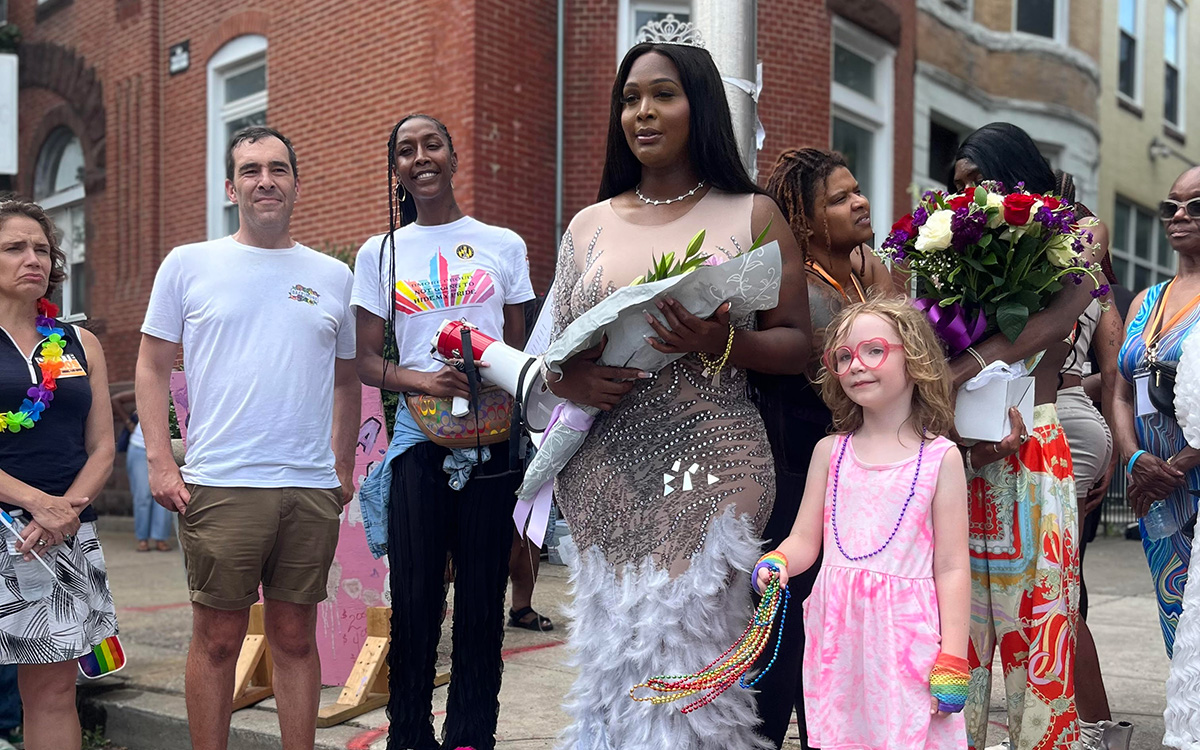
Baltimore city officials and LGBTQ activists participated in a ceremony on June 29 officially dedicating the renaming of a street in honor of transgender woman Iya Dammons, who founded and serves as executive director of the LGBTQ services organization Maryland Safe Haven.
A section of Baltimore’s 21st Street at the intersection of North Charles Street, where the Maryland Safe Haven offices are located, has been renamed Iya Dammons Way.
The ceremony took place six years after Dammons founded Maryland Safe Haven in 2018 and one year after she launched a Safe Haven operation in D.C.in 2023 located at 331 H St., N.E.
A statement on its website says Safe Haven provides a wide range of supportive services for LGBTQ people in need, with a special outreach to Black trans women “navigating survival mode” living.
“Through compassionate harm reduction and upward mobility services, advocacy support, and community engagement, we foster a respectful, non-judgmental environment that empowers individual agency,” the statement says. “Our programs encompass community outreach, a drop-in center providing HIV testing, harm reduction, PrEP, medical linkage, case management, and assistance in accessing housing services,” it says.
Among those participating in the street renaming ceremony were Baltimore City Council member Zeke Cohen, interim director of Baltimore Mayor Brandon Scott’s Office of LGBTQ Affairs Alexis Blackmon, and Dominique Morgan, an official with the national foundation Borealis Philanthropy, which provides financial support for transgender supportive nonprofit organizations, including Safe Haven.
“This is a significant achievement and historic moment for our city,” a statement by Maryland Safe Haven announcing the ceremony says. “Iya Dammons has been a tireless advocate for transgender rights and has worked tirelessly to provide safe spaces and resources for transgender individuals in our city,” it says. “This honor is well-deserved, and we are thrilled to see her contributions recognized in such a meaningful way.”
Baltimore
Despite record crowds, Baltimore Pride’s LGBTQ critics say organizers dropped the ball
People on social media expressed concern about block party stampede
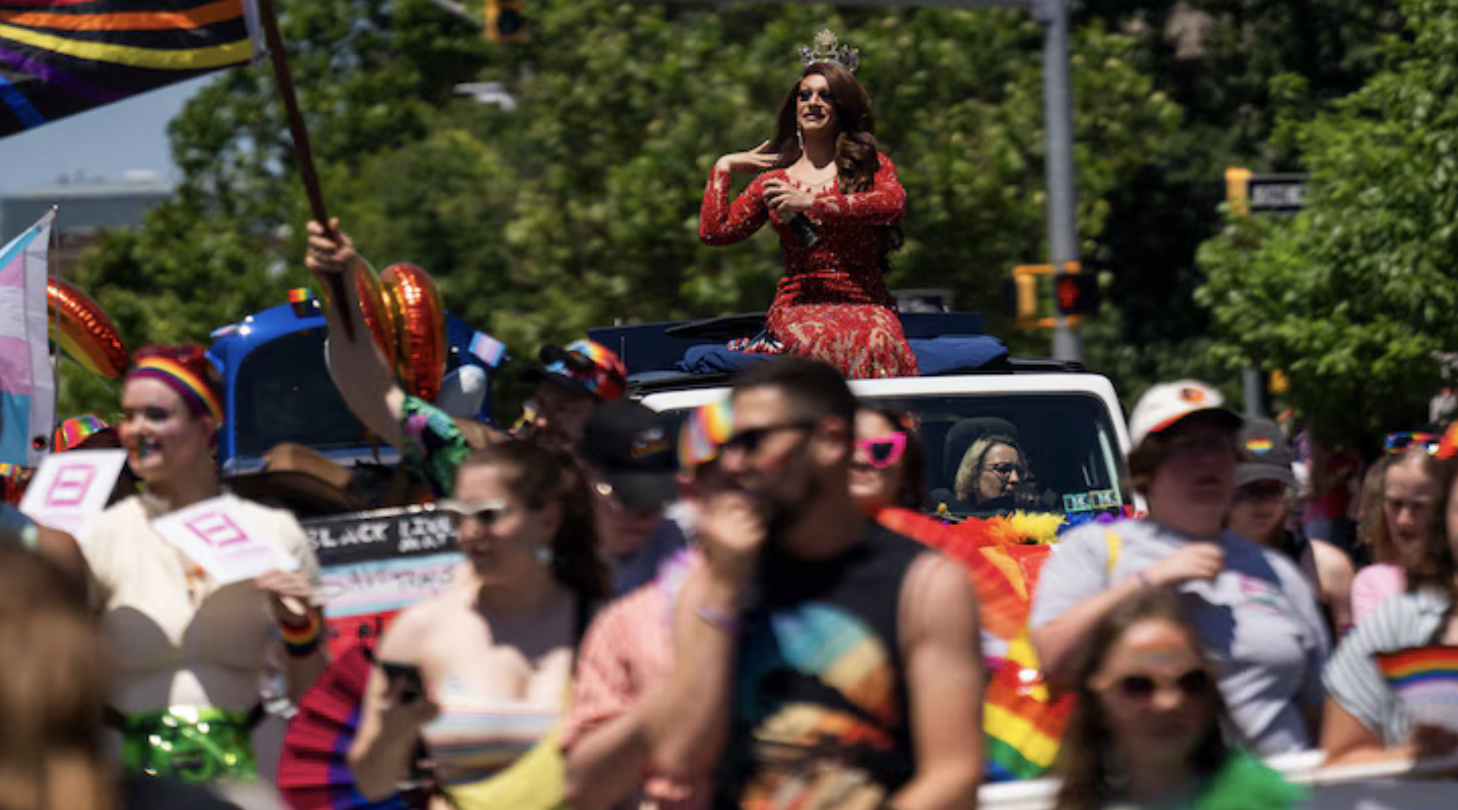
BY JOHN-JOHN WILLIAMS IV | This year’s Baltimore Pride Week attracted 150,000 people — record attendance that far exceeded initial projections of 100,000.
But some see room for improvement and want organizers to address safety issues and make changes so the annual event that celebrates the LGBTQ population is better run.
The rest of this article can be found on the Baltimore Banner’s website.
-

 Canada1 day ago
Canada1 day agoToronto Pride parade cancelled after pro-Palestinian protesters disrupt it
-

 Theater4 days ago
Theater4 days agoStephen Mark Lukas makes sublime turn in ‘Funny Girl’
-

 Baltimore3 days ago
Baltimore3 days agoDespite record crowds, Baltimore Pride’s LGBTQ critics say organizers dropped the ball
-

 Sports4 days ago
Sports4 days agoHaters troll official Olympics Instagram for celebrating gay athlete and boyfriend





